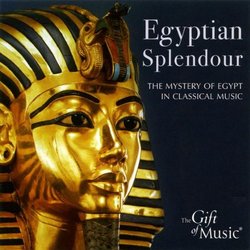| All Artists: Various Title: Egyptian Splendour Members Wishing: 0 Total Copies: 0 Label: The Gift of Music Original Release Date: 1/1/2008 Re-Release Date: 3/2/2007 Genres: Special Interest, Pop, Classical Styles: Marches, Vocal Pop, Opera & Classical Vocal, Forms & Genres, Concertos, Fantasies, Symphonies, Instruments, Keyboard, Symphonies Number of Discs: 1 SwapaCD Credits: 1 UPC: 658592119022 |
Search - Various :: Egyptian Splendour
 | Various Egyptian Splendour Genres: Special Interest, Pop, Classical
An exotic collection of classical music which evokes the mysterious world of classical Egypt. These major works have all been chosen for their great tunes, rich harmonies and colourful orchestrations and they bring a far-o... more » |
Larger Image |
CD Details
Synopsis
Product Description
An exotic collection of classical music which evokes the mysterious world of classical Egypt. These major works have all been chosen for their great tunes, rich harmonies and colourful orchestrations and they bring a far-off world to life in a vibrant and exciting way. Verdi, Debussy, Saint-Säens and others in some of their most colourful and imaginative compositions. Japan opened its doors to the West in the middle of the century and the deepest parts of Africa began finally to give up their secrets to men such as Livingstone and Stanley. African and Oriental artifacts were traded widely and began to influence entire artistic movements and generate commercial successes such as Liberty s Regent Street shop in London. The discoveries of the treasures of the Nile delta further fuelled the public s appetite for the exotic. These exciting developments were mirrored in the world of music: on the one hand some composers looked to their own folk roots and cultures to revitalize their work the music of Wagner and Grieg are two widely differing aspects of this but on the other, many musicians embraced the exotic with an even greater enthusiasm, finding that the new and the very different had a huge appeal. But each composer approached the subject in his own way, overlaying this new interest with the traditions of his own musical background. For Giuseppe Verdi, Egypt proved a potent force for huge and lavish drama. Aida is a musical spectacle on a grand scale, in the full and bold tradition of nineteenth-century Italian opera, in which the Egyptian theme provides an opportunity for colour and vitality as well as an undercurrent of Italian nationalism. Johann Strauss s interpretation was less profound: his March is really Viennese in every way, with just a hint of the exotic wrapped up in the title and in a certain way with the shapes of his grand melodies. Grieg used a sort of modal harmony in his Arab Dance , although, of course, it was merely an interlude in his music for Ibsen s Peer Gynt , a nationalistic work which was most concerned with Norway s rather than Egypt s past. Claude Debussy went much further than Grieg and Strauss. He studied and admired the different musical scales of Eastern music and incorporated their shimmering sonorities into his own compositions. He even owned two canopes , Egyptian funeral urns, and perhaps they inspired the rather inscrutable piano piece Canope , in which, through a careful use of harmony and melody, time appears to stand still. If Canope seems like a cool and collected type of meditation, an exercise in classical restraint, then its contrast with Massenet s warm-hearted, almost sentimental Meditation could not be more extreme. Massenet s famous work comes from his opera Thaïs which tells the tale of a fourth century Egyptian courtesan, in a plot drawn from a novel by the French author Anatole France. The anonymous Egyptian love song presents Egypt in a mannered eighteenth-century style, little different from any other song arrangement of the period, but Saint-Säens and Balakirev both embraced the exotic opportunity of Africa with abandon. The African Fantasy is an extraordinary work, for while it retains a fairly traditional nineteenth century harmonic language; its melodies and rhythms are different from almost anything else he wrote. Balakirev was always a visionary, composing piano music of huge technical difficulty for both player and instrument. Islamey is famous for being one of the most difficult works in the repertoire and for its outrageously exotic sonorities.

 Track Listings (9) - Disc #1
Track Listings (9) - Disc #1